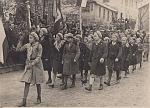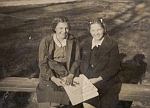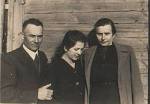| |
 | |
 |
Letter and fragments of reminiscences
of Dr Teresa Borkowska-Wójtowicz
Warsaw, December 31, 2004
Dear Doctor Wajszczuk,
I want to thank you for your efforts in recreating the history of the
Wajszczuk family in Krasnystaw. Wise, interesting, intelligent, good (people).
Memory of Their Home remained with us until this day. In the evenings,
Mrs. Wajszczuk read to us the "Hurricane" by Gasiorowski, or "Adventures
of Beniowski", this exerted a great influence on us.
I re-read this letter many times. I made corrections, moved around the
sections, trying to express best the atmosphere of the Wajszczuk Home.
However, I cannot express with words, how much did the experiences
shared with the Wajszczuk Family left in me. Because they encompass
everything - the children's plays, quarrels, happiness, and later pain
and tears.
Teresa Borkowska-Wójtowicz
Warsaw, January 3, 2005.
Dear Doctor Wajszczuk,
My memories of the Wajszczuk family start with the arrival of Basia
Wajszczuk at the A. Mickiewicz Grammar School (in Krsnystaw - WJW), it
was the year of 1936. Our appartments were separated by a narrow
street and the windows were facing each other. It was 1936, because in
the fall of 1937 we moved to the Leszczynski house, where the Post
Office is now located. We were friends with the whole family. Parents
with parents and children with children. (...) The Wajszczuk house was
full of love, warmth, happiness, easy manners and prosperity. One did
not have to apply oneself too rigorously to studying, and the parents
were quite tolerant. We were envious of this aspect - I and my two
brothers, who were contemporaries of Wojtek. The rest of the day after
school, we were spending again together. In summer, we run in the
meadows. The boys played war games and the girls - hide-and-seek. We
were also making excursions by bicycle. All three young Wajszczuks
owned bicycles, so did I - a "Zawadzki" lady's bicycle. (...) In
winter, we were attaching skates to the shoes and then we were
spending whole afternoons on the artificial skating rink, on the
frozen Wieprz river or on the sleighs. In the evenings, our parents
were going to the Social Club. (...) They played cards, danced or
gossiped. These activities continued until the outbrake of the war.
|

"Emilia Plater" Girl Scout Squad from Krasnystaw. Independence Day
celebration. Krasnystaw - 11 XI 1938. The squad is led by
Teresa Borkowska. Barbara is in the second row (indicated with a
white cross) |
As we have been raised in families who fought for
free Poland and fed us stories about the war adventures of our
grandfathers, fathers and cousins, we considered the war to be an
adventure which we also were allowed to experience. We were looking
forward to it. Basia and I were the Girl Scouts. Our squad was named
after Emilia Plater. As a squad leader, I was requested to organize
services in the District Office after the regular employees left their
jobs. The task included preparation of list of persons who wanted to
see the "Starost" (Head of the District) to receive gasoline coupons.
Gasoline meant life for many people, who were running away in cars
from the advancing German army. The town was full of abandoned
automobiles, because of the fuel shortage. We were working in two
shifts. One day in the evening, during a bombing raid, the Starost, Mr.
Olejniczakowski approached us and asked, who would be willing to
volunteer to ride to the railroad station to search for a Mr "X".
Basia and I volunteered. By car, with the lights turned off, curled up
and scared, we arrived at the station. After entering - the station
was full of people and of smoke, extremely crowded - we called the
man's name, but to no avail. This trip produced an even stronger bond
between us.
|

From left: Teresa Borkowska and Barbara Wajszczuk.
Krasnystaw - 4 V 1940
Picture taken by Basia's brother - Antek 0083 |
In the late fall, we entered the seventh grade of
Grammar School. However, it was dissolved very soon, since it was
attended by children who were 14 years old and those were being
deported to Germany for forced labor. The winter of 1939/1940 was very
frosty. (...) There were skates and sleighs until the curfew hour -
plenty of free time. First sweethearts - Antek kissed my hand, I did
not wash it for quite a while. German officers and soldiers lived in
our apartment. (...) Liquidation of the Jews started in 1941; we were
forced to leave our apartment and given two hours to do it. We were
given replacement quarters at the 3 Maja Square. (...) We lived again
"across the road" from the Wajszczuk family. (...) At that time my
brothers lived with the grandparents and I stayed with Dr Wajszczuk's
family. German soldiers were replaced by the Gestapo men, German
police, collaborating Polish police and German gendarmes. A Gestapo
man took residence in Dr Wajszczuk's drawing- room. Polish Police
station was placed on the first floor of the apartment building.
Arrests of the Poles began. (...)
At the time of my stay with the Wajszczuk family,
Dr Wajszczuk worked in the morning at the Hospital and in the
afternoon was seeing patients in a private consultation room, which
was part of the apartment. The apartment had two entrances. Rear (kitchen)
entrance and front entrance with a large but dark waiting room. The
doctor had many patients and was earning good money. National Health
Service did not exist. Nobody was insured. Everybody was a private
patient and the doctor's waiting room was always full. He did not have
time to sit with us at supper. Milk soup with noodles was the most
frequently served meal, which I hated, but ate. Bread was available on
ration-cards, it was like clay and available in small amounts. A sort
of pancakes, called "prenadels", were prepared from sugar beets,
stolen from the farmers' carts and mixed with flower. We were carrying
them with Basia on trays to the bakery, where they were baked for a
few pennies after the baking of bread was finished. At one time, while
eating the milk soup or prenadels, Dr Wajszczuk was telling us a story
about a visit to the horse races in Warsaw, where he suddenly
overheard some words of admiration "about a beautiful woman with green
eyes". He looked around to see her and then realized that they were
talking about his wife. Dr Wajszczuk was telling me: "You will stay in
our family - you will see".
We had our responsibilities - cleaning, washing
dishes - taking turns with Danusia. Danusia was very delicate, quiet.
Internal warmth radiated from her. (...) Danusia looked very much like
her ancestress, in a portrait which the doctor and Antek brought from
Siedlce. There were two portraits, without frames, rolled up.
Antek became very secretive. He was disappearing
for hours. He attended the (clandestine) officer cadet's course.
Wojtek became friends with various boys. He was also disappearing from
sight. Did not want to tell, where he was going and with whom. Once,
we were all looking for him until the police curfew time. When he
reappeared in the morning, we found out that he spent the night at a
taylor's house, with who's limping son he became good friends. (...)
Everybody was very worried about Wojtek. He could, inadvertently, by
talking too much, bring a calamity - Germans - on the family, which
was engaged in a conspiratorial activity.
Children were visiting the summer home in Zolkiewka.* (...)
|

Basia Wajszczukowna (0084), shortly after the death of her father,
in the company of her uncle Stanislaw (BG010) Biegunski and his wife
Aleksandra.
Photograph submitted by Wlodzimierz Biegunski |
Doctor Wajszczuk died a cardiac death. I suspect
that it was the so-called "instantaneous death" - Dr Wajszczuk was
found in his office. He held in his hand a syringe filled with
medication. He was found by patients waiting for consultation in the
waiting room. Minutes were passing. Because, neither the doctor nor a
patient were emerging, they opened the door and found the doctor dead,
lying on the floor.
After Dr Wajszczuk's death, I met with the whole family: Mrs.
Wajszczuk, Danusia, Antek, Basia and Wojtek. The women wore the
mourning attire, I was surprised with them. Black dresses touched the
floor and the faces were covered with black veils. Basia told me that
this is the family tradition and these outfits will be worn for 40
days. I spent all day with them. The apartment was being liquidated,
new arrangements were being discussed. (...)
When we lived "window-to-window" with the Wajszczuk
family, we used to wrap letters around a stone, tie with a string and
throw it across the street. We were standing on the balcony and they -
in the window. Unfortunately, we were cought and this was the end of
the game. My brothers were "cought" once by Dr Wajszczuk, while they
were swinging from the radio antenna and because of that, he could not
receive the broadcast.
(Continuation of the reminiscences after a telephone conversation).
I am sure that Dr Wajszczuk belonged to the Underground Organization
ZWZ, which was transformed later into the AK (Home Army). I am basing
this assumption on the following incident: One day in summer of 1941
in the afternoon Basia rushed to our apartment and asked my Mother, if
she would allow me to travel with her to Rejowiec - this was on Dr
Wajszczuk's request. My Mother agreed. In front of the house, where
the Wajszczuk family lived, there was standing a chaise with a driver.
In it was sitting an unknown woman. We were requested to sit next to
her. The woman was telling us about Warsaw, entertaining us - we
looked from a distance like a family. We arrived in Rejowiec to a
mansion, which was owned by Mr. Budny. We were placed at a long table
with many people already sitting there. We were served portions of
patatoes with buttermilk and afterwards, we retured with the same
chaise to Krasnystaw. This woman was a liaison officer or a courier.
Mr. Budny was later shot to death, in his own home, by an NKVD officer.
As simple as that - he entered, stopped, pulled out a revolver and
fired a shot. In the secret documents dating back to that period,
which were recently brought to light, a note was found from (General)
Sierow to Stalin, in which he notifies Stalin about taking posession
in Rejowiec of a large amount of gold and US currency, which belonged
to the AK. Krasnystaw, as well as Rejowiec, were subordinated to Chelm.
If there are any documents with the lists of names of members of the
AK - I do not know. (...)
Dear Doctor, I enclose my greetings, wishing you success in the "Labyrinth
of Ancestors"
Teresa Borkowska-Wójtowicz
* (WJW) - At the time of one of the telephone
conversations, Dr Borkowska-Wojtowicz mentioned also that Dr
Wajszczuk's wife most likely moved with the older children from
Zolkiewka to Krasnystaw earlier, before the great fire of 1938 (perhaps
only for the duration of the school year?), to alow them to attend
schools there.
After the fire (and during the war?), the children continued to spend
summers in Zolkiewka, in a small utility structure on the doctor's
property, which probably survived the fire.
Dr Borkowska: I do not know, if the structure survived the fire or it
was built afterwards, it was called "barak".
See also:
Prepared by: Waldemar J Wajszczuk & Paweł Stefaniuk 2000-2024
e-mail:
drzewo.rodziny.wajszczuk@gmail.com
|
|
 | |
 |
|
|
|